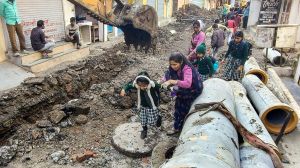Nepal rushes ahead
By doing too many things too soon, the Koirala govt puts at risk its ability to rule effectively

In the wake of any revolution, finding a balance between popular demands for radical reform and considerations of stability is always difficult. Less than a month after it took charge of Nepal following the huge democracy movement, the new government led by the seven-party alliance has chosen to bow to the former and risk the latter.
The proclamation issued Thursday in Kathmandu by the parliament on clipping the monarchy8217;s powers and restructuring the state in Nepal is breathtaking in its ambition. The decisions to end the Hindu religious orientation of the state in Nepal, put the armed forces under civilian control, abolish the privy council, and place all the privileges of the monarchy at the pleasure of parliament have been widely welcomed in Nepal. To be sure, last month8217;s 8216;jan andolan8217; in Nepal was against King Gyanendra8217;s autocratic rule. And the parliament was merely bowing to the logic of that democratic revolution. But in doing too many things too soon, the government led by Girija Prasad Koirala might have put in jeopardy its ability to govern effectively until the political transition to a new constitution is made. The technical legality of the decisions taken by an interim arrangement in Kathmandu in defiance of the existing constitution is already being questioned. In our view the practical questions on managing the revolution are more germane. In responding to the popular sentiment against King Gyanendra and pushing Nepal closer towards a secular republic, Koirala has not necessarily won concessions from the Maoists on renouncing violence, surrendering arms before elections to the constituent assembly and allowing the people to exercise their political will freely. The first reaction from the Maoists to the proclamation suggests they have not been satiated. They have criticised the parliament for not declaring Nepal a republic and not giving credence to the Maoist claim on engineering the popular rebellion.
The Koirala government must now do its best to prevent any disaffection in the army and the security forces and maintain enough pressure on the Maoists to do their bit for peace and stability. In judging the wisdom of actions of the Nepal parliament this week, the jury will be out until the government demonstrates its capacity to rein in the Maoists. Most revolutions start with good intentions but only a few avoid being hijacked by extremists.
- 01
- 02
- 03
- 04
- 05






























